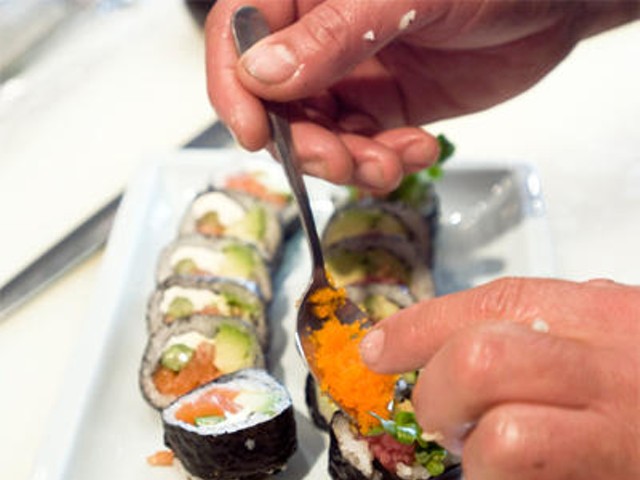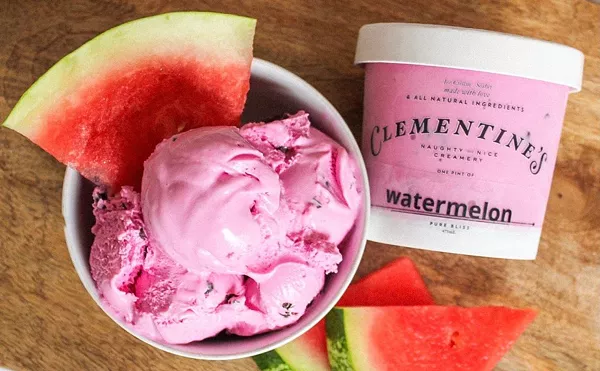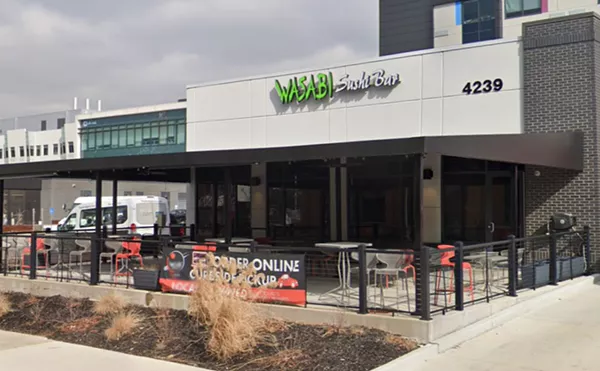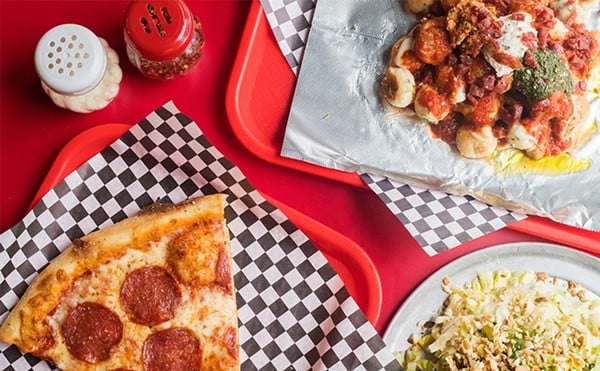I write this week's column having just traded in — for about enough cash to buy one of those "melty" quesadilla-type things Taco Bell advertises — the car in which I've driven to almost every restaurant I've reviewed for this newspaper. I'm not sentimental about this car. Its time had come. But after informing the insurance adjuster and the body-shop guy and another insurance adjuster and the guy who took it for the cost of the aforementioned melty thing how many miles were on it, I can't help a moment's reflection: I've been to many, many restaurants over the past couple of years. Hundreds and hundreds. Some you've read about in this space; many more you haven't. But each contributed to the steady upward ticking on the odometer of my battered and now departed car.
The last spot I visited in this car, its crumpled hood rattling even below highway speed, threatening to fly up at any moment — the risks I take for you! — was Momoyama's, a sushi restaurant in Chesterfield. Momoyama's opened in December of last year, though it's new in name more than in fact. Previously, it was Yoshi's Japanese Sushi Restaurant, and for the most part, Momoyama's has retained Yoshi's look, menu and staff.
Though its location, in a sprawling strip mall anchored by a Trader Joe's grocery store, was thoroughly exurb, Yoshi's attracted sushi lovers from across St. Louis. They were drawn by owner Yoshio Aoki's reputation as one of the area's top sushi chefs: Prior to opening Yoshi's, he was the "Mr. Sushi" behind Olivette's I Love Mr. Sushi. Just last year Riverfront Times awarded Yoshi's Best Sushi, writing, "His nigiri sushi is so fresh that you might imagine Chesterfield as a town on the Pacific, and the flavor is the perfect balance of pure ocean essence and properly seasoned rice."
What's more, a visit to Yoshi's felt different from a meal at most other St. Louis sushi restaurants. Sushi has become such an integral part of our dining landscape, ordered in shopping-mall food courts and picked up from the supermarket case as easily as a salad or sandwich, that it often seems like just another category of fast-casual restaurant. Check the boxes on your order form, and watch the chefs assemble your order on the line.
Yoshi's didn't counter this with the formal reverence of a True Sushi Restaurant, where the bar is an altar and the chef a high priest before whom you must genuflect. The space itself was very casual, as unremarkable as most other storefront restaurants. But it felt like a family gathering: Yoshi and the other chefs greeted customers like old friends, teased one another and announced with verve when an order was ready. It was the sort of place you would want to go whether it sold sushi, fried chicken or ball bearings.
I still remember my first visit, my wife and I wedged knee-to-knee into the only open seats at the bar — the only open seats, period — on a Saturday night. I ate the sweetest, most luscious salmon I'd ever had. I chased it with an ice-cold Sapporo. I was happy.
As a professional restaurant critic, I can't get too attached to one restaurant. And I live too far from Chesterfield to be a regular at any restaurant there. Still, when I heard Yoshio Aoki had closed his namesake restaurant, I felt a twinge of regret. When had I eaten there last?
I soon learned that Yoshi's would reopen under a new name, that many from the original staff would be returning — that Aoki himself was helping the new owners. Still, it wasn't until I walked into the restaurant on a Saturday night and heard the friendly chatter of the sushi chefs that I allowed myself to hope Momoyama's could be a worthy successor — if not a carbon-copy replacement.
I'm sure I've said it before, but a sushi restaurant is very difficult to critique, maybe the most difficult of all restaurant types, especially in St. Louis, where the sushi restaurants for all intents and purposes have the same menu, and the difference between any two or three of them can be as arcane as the amount of wasabi brushed atop the rice on a piece of nigiri sushi.
My standards are simple: Is the fish impeccably fresh, and is it presented with minimal intrusion upon its natural flavors? By this accounting, Momoyama's is a success. While the salmon nigiri might not have compared to what I enjoyed during my first meal at Yoshi's, it was very good, with that soft, supple texture and light flavor that I love more than any cooked salmon dish.
My vote for most underrated sushi is mackerel: I always order at least one piece of the oily fish, whose flavor I find closest to the salty smack of ocean water. At Momoyama's the cut is very generous, the fish draped in such a way to obscure the rice, and the flavor is pure and powerful.
Sea bass, yellowtail, unagi: Each piece was straightforward and delicious. Only a piece of tuna struck me as light in both body and flavor. To be fair, though, I'm trying to consume as little tuna as possible because of sustainability concerns and ordered just one piece.
Most local sushi joints look to rolls as a way to differentiate themselves. Here I'm a bit at sea: I prefer the classic futomaki — the simple, sweet combination of egg and pickled daikon. I find more ambitious rolls too busy. Momoyama's futomaki are very good, but the "White Tiger" roll falls into the ambition trap, with shrimp tempura, crab meat and avocado inside the roll, and albacore or "white" tuna dressed with three different sauces on the exterior. Though pretty on the plate, the sauces occupied that unfortunate territory: just distinctive enough (vaguely wasabi-barbecue-mayo) to bury other flavors, not so distinctive as to be memorable.
Still, if you like these sorts of rolls, I think you will enjoy those at Momoyama's. In the end, it's the atmosphere that will bring you back. And if, on one of those trips, you see a guy sitting inside his shiny new car in the parking lot, eating a melty Taco Bell quesadilla, say hello.





